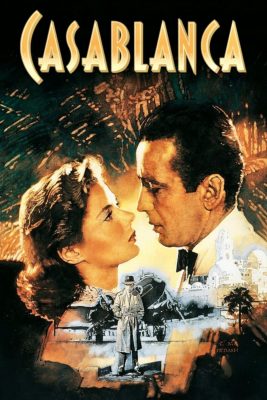
In December 1941, American expatriate Rick Blaine (Humphrey Bogart) is the proprietor of a popular nightclub and gambling den in Casablanca, known as “Rick’s Café Américain”. This venue attracts a diverse crowd, encompassing Vichy French and Nazi German officials, desperate refugees striving to reach the neutrality of the United States, and predators seeking to exploit them.
The Enigmatic Proprietor: Rick Blaine
Rick presents himself as a neutral figure in all matters, a position reflecting his complex past. He had previously run guns to Ethiopia during the Second Italo-Ethiopian War and taken up arms on the Republican side in the Spanish Civil War. Despite his self-professed indifference, Rick often shows empathy for the refugees and displays a distinct contempt for the oppressive fascist regimes.
The Arrival of Ugarte: A Plot Twist
Petty crook Ugarte (Peter Lorre) struts into Rick’s establishment, boasting about “letters of transit” he obtained through the murder of two German couriers. These valuable papers provide unrestricted passage around German-occupied Europe and into neutral Portugal, making them an invaluable asset for the refugees trapped in Casablanca. Ugarte intends to sell these letters at Rick’s club and persuades Rick to safeguard them.
Arrest and Death of Ugarte: Rick’s Secret
However, before Ugarte can finalize his plans, he is arrested by the local police force under the command of Captain Louis Renault (Claude Rains), the openly corrupt prefect of police. In a twist of fate, Ugarte dies while in police custody without disclosing that Rick is the custodian of the coveted transit letters.
The Arrival of Ilsa and Victor
Rick’s former lover, Ilsa Lund (Ingrid Bergman), enters his establishment, reigniting his cynicism. She requests house pianist Sam (Dooley Wilson) to play “As Time Goes By”, a song that evokes strong emotions in Rick. Ilsa is accompanied by her husband, Victor Laszlo (Paul Henreid), a renowned fugitive Czechoslovak Resistance leader. The couple needs the letters to escape to America, as German Major Strasser (Conrad Veidt) has arrived in Casablanca to arrest Laszlo.
The Struggle for the Letters
Laszlo inquires about the letters, and Signor Ferrari (Sydney Greenstreet), an underworld figure and Rick’s friendly business rival, reveals his suspicion that Rick has them. When Laszlo tries to buy the letters, Rick refuses and tells him to ask his wife why. Their conversation is interrupted by Strasser leading German officers in singing “Die Wacht am Rhein”. In response, Laszlo instructs the house band to play “La Marseillaise”, sparking patriotic fervor that drowns out the Germans. Strasser, fearing the spirit Laszlo can inspire, orders Renault to close the club.
Ilsa’s Confession and Rick’s Dilemma
Later, Ilsa confronts Rick in the deserted café. She threatens him with a gun, but confesses her love for him when he refuses to give her the letters. She explains that she believed her husband had died in a concentration camp when they fell in love in Paris in 1940. Discovering Laszlo was alive and hiding near Paris, she left Rick without explanation to care for her sick husband. Rick’s bitterness dissolves, and he agrees to help, letting her believe she will stay with him when Laszlo leaves.
A Sacrifice for Love and a New Beginning
When Laszlo is arrested on false charges, Rick persuades Renault to release him, promising to set him up for a more serious crime: possession of the letters. Rick reveals his plan to leave for America with Ilsa, but at the last moment, he makes her board the plane to Lisbon with Laszlo, telling her she would regret staying. As Strasser attempts to stop the plane, Rick shoots him dead. Renault orders the police to “round up the usual suspects” and suggests joining the Free French in Brazzaville. As they walk away into the fog, Rick says, “Louis, I think this is the beginning of a beautiful friendship.”
Movie Review
“Casablanca” is a 1942 American romantic drama film directed by Michael Curtiz and starring Humphrey Bogart, Ingrid Bergman, and Paul Henreid. The movie is set during World War II and follows the story of Rick Blaine, a cynical expatriate who must choose between love and patriotism when his former lover, Ilsa Lund, re-enters his life in Casablanca.
The film is a timeless masterpiece of American cinema, with its captivating storytelling, memorable characters, and iconic dialogue. Its exploration of love, sacrifice, and moral dilemmas amidst the backdrop of war has made it one of the most beloved films of all time.
The film’s visual style, from its evocative lighting and shadow play to its atmospheric sets and costumes, is masterfully crafted, creating a sense of time and place that immerses the audience in the world of Casablanca. The use of close-ups and subtle gestures conveys the characters’ emotions and internal conflicts, adding depth and intimacy to the storytelling.
The screenplay, written by Julius J. Epstein, Philip G. Epstein, and Howard Koch, presents a captivating narrative that weaves romance, politics, and intrigue into a compelling web of storytelling. The film’s dialogue is renowned for its wit and memorable lines, with iconic phrases like “Here’s looking at you, kid” and “Play it again, Sam” becoming part of cinematic history. The script expertly balances romance and suspense, offering a powerful exploration of love and sacrifice in times of uncertainty.
Rick Blaine’s evolution from a cynical loner to a selfless hero showcases the complexities of human nature and the potential for redemption. The film’s exploration of loyalty, honor, and the power of love is brought to life through the compelling performances of the cast.
The film’s musical score, composed by Max Steiner, is another standout element that enhances the emotional impact of the story. The memorable theme, “As Time Goes By,” adds to the timeless quality of the film and evokes a sense of nostalgia and longing. The music serves as a powerful storytelling tool, heightening the emotional depth of key scenes and capturing the essence of the characters’ emotions.